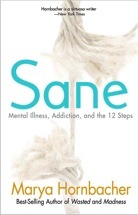
“It’s so easy. It’s like eating. You put it in your mouth and swallow,” bestselling author Marya Hornbacher told me in regard to taking medication for a mental illness.
“If you want to go back to the Twelve Steps, it’s number three. You made the decision to turn your will and your life over, not to medication, but to recovery,” she continued.
And turning her life over is just what Marya had to do in order to overcome, not only an eating disorder as discussed in the first post in this series, but also bipolar disorder, self-harm, as well as alcoholism and drug abuse.
“We’re in a culture where there’s any number of means of self-destruction available. And for some of us, we pick all. We don’t really dedicate ourselves fully to one,” she told me.
With her addictive personality and underlying brain chemistry, Marya, at one time, chose anything extreme for that dopamine rush—no matter how negative. Surprisingly, she said that struggling with so many destructive behaviors made “recovery, as a whole, easier.”
“I know that probably sounds pretty bizarre,” she admitted. But she explained that being able to work on her entire psychological and physiological state actually made the recovery process smoother.

Regardless of how many problems you may struggle with, Marya encourages you—whether you like it or not—to first cut out the destructive behaviors. (Yes, that means all of them.) The first step in recovery is to physiologically restore.
With eating disorder recovery, she said, “You re-feed, you get yourself nourished again and …suddenly your brain starts to work a lot clearer.”
In regard to alcoholism, Marya told me, “You take away my scotch and I’m like, oh no, I want it back…But gradually, the longer it’s out of my system, I start realizing the cost benefit, the tradeoff basically, with so many more benefits in health…”
When it comes to bipolar disorder and depression, she made clear, “restoring health means taking your medication.” While some complain that they can’t function as well and are less creative on medication, Marya shares exactly the opposite. With the appropriate medicine, she works better and is more creative.
“All the meds do is help you maintain that equilibrium. Doesn’t make you less you,” she added.
Only when those of us who battle mental illness restore our physical health can we realistically answer that inevitable question, “Do I really want to destroy my life and everything in it?”
Marya ultimately answered this question, one that she brought up in our conversation, with a resounding no. But, the beginning of her recovery wasn’t quite so resounding. It was more like a hesitant leap of faith.
I asked Marya how others could follow her lead, take that leap of faith, and let go. Importantly, she said, “Embracing letting go is not the first step. Letting go is the first step.”
She clarified, “I think there’s a certain level to which we have to give ourselves time to emotionally acclimate to the decision to recover. Most of us don’t go galloping into recovery gleefully.”
But ultimately, and I know this from my personal experience with an eating disorder, we must start galloping—gleefully or not. We save ourselves by taking action. Letting go doesn’t mean sitting back and waiting for recovery to find you. In Madness: A Bipolar Life, Marya wrote:
There is a self-perpetuating belief that one simply cannot help it, and this is very dangerous. It becomes an identity in and of itself. It becomes its own religion, and you wait for salvation, and you wait, and wait, and wait, and do not save yourself.
 We must stop waiting. Marya’s work is all about empowering people to be pro-active. As eluded to above and as she wrote about in Sane: Mental Illness, Addiction, and the Twelve Steps, a large part of being proactive, for her, has been practicing the Twelve Steps as a program of recovery.
We must stop waiting. Marya’s work is all about empowering people to be pro-active. As eluded to above and as she wrote about in Sane: Mental Illness, Addiction, and the Twelve Steps, a large part of being proactive, for her, has been practicing the Twelve Steps as a program of recovery.
Although she hasn’t written specifically about applying the Twelve Steps to eating disorder recovery in any of her books, Marya has incorporated twelve-step work into this aspect of her healing journey as well. (I had to ask!) In fact, she credits her full recovery from an eating disorder to this kind of ongoing spiritual growth.
If you have trouble with the concept of God or a higher power and have even used this as a reason not to go to twelve-step meetings, Marya has written a book just for you. It’s another powerful one called Waiting: A Nonbeliever’s Higher Power. Don’t let the title fool you. This book has nothing to do with sitting back idly .
 To get better, we must step away from all of the excuses for why we can’t and start moving toward the reasons we can. Marya says that we must devise our own recoveries. This might include the help of professionals, friends, family members, and, yes, medication. Marya points out that someone with diabetes wouldn’t try to survive without insulin. With this post, I encourage you to take your “insulin”—whatever that might be. What do you need to do right now to choose recovery? What does letting go look like for you today?
To get better, we must step away from all of the excuses for why we can’t and start moving toward the reasons we can. Marya says that we must devise our own recoveries. This might include the help of professionals, friends, family members, and, yes, medication. Marya points out that someone with diabetes wouldn’t try to survive without insulin. With this post, I encourage you to take your “insulin”—whatever that might be. What do you need to do right now to choose recovery? What does letting go look like for you today?
This post is one in a Life Without Ed Birthday Blog Series celebrating both recovery and the Tenth Anniversary Edition of the book.








